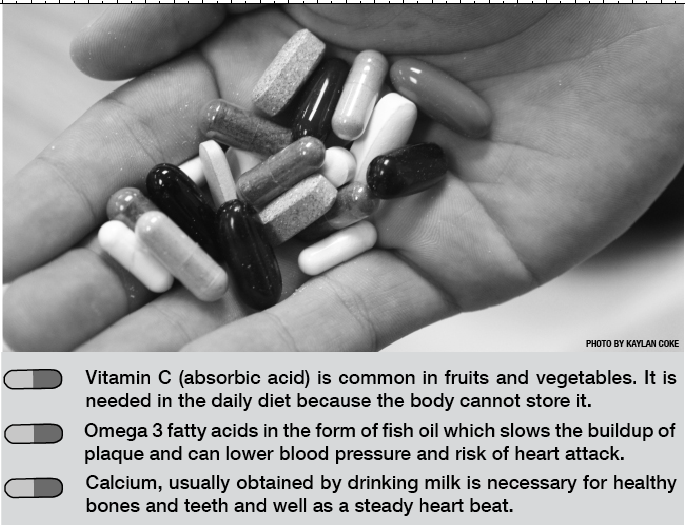
Photo by Kaylan Coke
Parents have always reminded their kids of the importance of taking vitamins. From gummies to old-fashioned chewables, children are told that taking their vitamins will keep them healthy and help them grow strong. However, new studies reveal that synthetic vitamins may not be as beneficial as everyone says.
One of the earliest findings of vitamin deficiency is scurvy, present in mariners on long voyages. It was first described by Hippocrates around 460 BC. In the 1700s it was proposed that this disease could be prevented by the consumption of citrus fruits, linking scurvy to a deficiency in vitamin C.
The word “vitamin” comes from “vita” meaning life and “amine” which is a type of organic compound found in some vitamins. Everyone needs vitamins; however, people often receive these necessary nutrients from their usual diet. For these individuals, taking daily vitamins is a generally harmless but wasteful expense and effort.
“I’ve never been one to take vitamins,” senior Allison Rames said. “I feel that I’m healthy enough without them and they wouldn’t benefit me at all. Plus, I don’t believe in Western medicine.”
People only need vitamins in small amounts, usually from what they already eat. By eating just a few fruits and vegetables a day, they obtain vitamin A, vitamin E, vitamin C, vitamin B-6 and folate. The average person’s intake of meat provides them with vitamin A, vitamin B-6 and vitamin B-12.
For others, however, getting supplemental vitamins is vital. They may not eat a balanced diet or may be unable to digest and absorb certain vitamins.
“I take vitamin C and vitamin A,” sophomore Santiago Stanham said. “My doctor told me that my body required a boost of those two vitamins in order for me to have a strong immune system and if not I would get sick more often. That was five years ago. Ever since then, I’ve been taking the vitamins and I rarely get sick anymore.”
Taking too much of certain vitamins is potentially dangerous. A study printed in the Archives of Internal Medicine found that several commonly used vitamin and mineral supplements were associated with various health issues. For instance, too much vitamin C or zinc can cause nausea, diarrhea and stomach cramps. Likewise, too much selenium can lead to problems including hair loss, gastrointestinal upset, fatigue and mild nerve damage. An Iowa Women’s Health associated the use of certain supplements was associated with an increased mortality rate. Supplements are chemicals that can sometimes act as dangerous toxins to the body.
“Problems arise when someone abuses a vitamin and takes excess amount,” said Rebecca Karousatos, a dietician. “I recommend a simple multivitamin for teenagers since they do not eat a very well balanced diet. They tend to eat a lot of fatty foods and lack fruits and vegetables.”
The trick is to sort out what vitamins and quantities are necessary for specific individuals and what will prove pointless or even harmful. More is not necessarily better.


